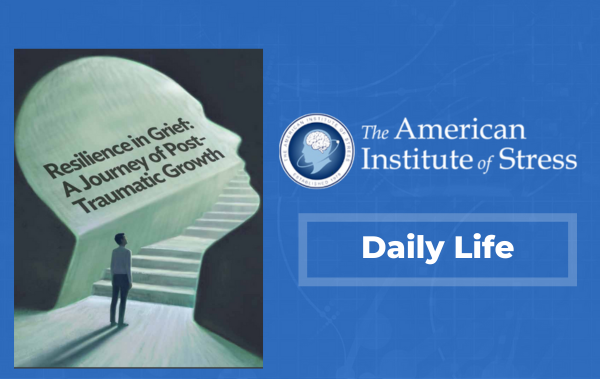Gray hair, the urge to pee, a sharpened sense of smell, and many more

 you’ve ever experienced a tension headache after a long week at work, then you’ve had a glimpse of the physical effects of stress on your body. But beyond that headache, along with the classic racing heart and strained muscles, stress can cause some lesser-known, even peculiar, symptoms.
you’ve ever experienced a tension headache after a long week at work, then you’ve had a glimpse of the physical effects of stress on your body. But beyond that headache, along with the classic racing heart and strained muscles, stress can cause some lesser-known, even peculiar, symptoms.The stress doesn’t have to be major to do it: Frederick Chen, MD, chief of family medicine at Harborview Medical Center and professor in the Department of Family Medicine at the University of Washington School of Medicine, says even small stressors — aggravating emails, subtweets — have an effect.
“The small stresses of everyday life can cause daily, low-level stress that activates stress hormones in the body, which ultimately affects how people feel,” he says. “The interesting thing is that we don’t always know why people respond in the way they do.”
Often, a long-term build-up of these minor stresses — when the body doesn’t go back to “normal” — causes people to experience weird symptoms. “Acute stress tends not to have an effect on health,” says Sharon Bergquist, MD, an assistant professor of medicine at Emory University School of Medicine. “It’s the activation of chronic stress when people don’t go back to their baseline of rest and recovery, that tends to affect people.”
Here are some of the most unusual things stress can cause in the body:
Hair loss and prematurely graying hair
Yufang Lin, MD, an integrative medicine physician at Cleveland Clinic, says stress can cause a temporary condition called telogen effluvium, which stops hair follicles from growing. This can lead hair strands to fall out more easily over time, often when someone is washing or brushing their hair. “Usually, the hair will start growing back once the stressful period ends,” Lin says.
Chronic stress can also cause people to lose pigment in their hair, resulting in premature graying, according to Chen. “You see this often with our elected officials over time — you can see that the level of work and constantly being ‘on’ has an effect on people,” he says.
Scientists recently uncovered a potential mechanism explaining why stress induces premature graying. Researchers found that the sympathetic nervous system, which is responsible for the fight-or-flight response, can affect the stem cells responsible for hair pigment. Sympathetic nerves that extend into the hair follicles release stress hormones, causing pigment-related stem cells to leave the hair follicle. Without those cells, no new pigment cells can be made — so all new hair becomes gray.
Increased sensitivity to pain
It’s well known that stress can cause physical tension, which can lead to painful headaches and neck and back pain. But stress can also affect how people experience pain, often causing an exaggerated response to an otherwise minor stimulus.
One study in children with recurring abdominal pain showed that stress reduced their tolerance for that pain, and in people with chronic pain, pain levels spike during periods of stress. Scientists think this heightened pain response might occur because stress can make the hormones that help people cope with painless effective.
Chen gives the example of a transgender patient who experienced debilitating back pain from a work injury, which resolved only after she shared her gender identity with her family.
“This patient had the most profound back pain I’d ever seen, and it lasted for years, with such an exaggerated pain response,” Chen says. “She had been hiding her transgender identity and had not been able to process that, and it was only after going through the transition that her pain completely resolved.”
Reduced fertility
Bergquist says stress can impact fertility in both men and women. It can disrupt a woman’s menstrual cycle, resulting in decreased ovulation and irregularity. In men, prolonged emotional stress is associated with a lower sperm count — and the sperm that are produced move less effectively, which can make conception difficult.
While experts aren’t totally sure of the exact physiological mechanisms at play in either scenario, Bergquist says during the stress response, the body conserves its energy to fight or flee, which takes resources away from “non-essential” functions, including fertility. One study suggests psychological stress may release steroid hormones that in turn blunt sperm production.
“The muscles in the lower part of the throat constrict under anxiety, which can create a sensation that you can’t swallow.”
Hot flashes
It’s normal for people to get a little sweaty when they’re nervous — scientists think sweat helps make people more slippery and difficult for a predator to catch. But chronic stress can cause people to sweat more in general — and for menopausal women, stress can lead to more severe hot flashes.
“Theoretically, this could be related to stress-induced hormonal changes, or it could be part of the cascade of fight-or-flight or hormones,” says Bergquist. “Fight or flight heightens the sympathetic nervous system, and with that, there’s naturally more sweating, since the entire body is working at a heightened state.”
A lump in the throat
Bergquist says she commonly sees stressed-out patients who feel like they can’t swallow due to a sensation of a “lump” in their throats — but physically, there’s nothing actually there. “The muscles in the lower part of the throat constrict under anxiety, which can create a sensation that you can’t swallow,” Bergquist says.
A heightened sense of smell and ringing in your ears
Ever notice how a familiar smell can bring a flood of memories with it? That’s because the parts of the brain that deal with scent and emotion have a close relationship. For some people, emotional stress can bring with it a heightened sense of smell; studies show that increased stress hormones in the body cause people to more accurately identify smells. One theory behind why: Lin says since stress puts the body in a hyper-aware state, the brain works harder to “sniff out” potential threats.
Some people also experience persistent ringing, buzzing, or chirping sounds in one or both ears when they’re stressed. Bergquist says this ringing, which is called tinnitus, may not always be related to what’s going on the ears. The amygdala, which is part of the brain that reacts to stress, also helps to process sound — which means stress and fear can cause ear ringing.
Flatulence, bloating, and a lot of peeing
Bergquist says the gut-brain communication that takes place during stress can sometimes lead to an imbalance of gut flora, which for some people leads to bloating or flatulence.
The intestines have their own nervous system — called the enteric nervous system — that connects to the brain. “The intestines can spasm when a person feels stress, and with that can come diarrhea, constipation, or flatulence — it’s different for every individual,” Bergquist says.
The fight-or-flight phenomenon causes all the body’s systems to ramp up to help a person escape. Lin says some people experience the urge to pee more frequently when they’re in a chronic state of stress. “During fear or anxiety, stress causes us to physically ‘dump’ so we can move faster,” she says.
Skin problems
Thanks to the gut-brain connection, stress can also cause skin problems in some people. When the body is under stress, it releases the hormone cortisol, which over time can cause the wall of the gut to become more easily permeated — so bacteria and toxins can “leak” through into the bloodstream. Scientists are still studying the implications of gut permeability, but Lin says the foreign bodies can activate the body’s immune response, which can cause itchy rashes or even chronic skin conditions like eczema or psoriasis.
Getting sick more easily
If the body is busy dealing with the constant threat of stress, Lin says the immune system can easily get run down, which means someone might catch sickness more easily.
“When you’re stressed, your body is on hyper-alert all the time because it’s waiting for a treat,” she says. “So when you get exposed to a virus or another infection, you’re not able to fight it as well because your resources have been stretched.”
One scientific theory about why stress weakens the immune response has to do with lowered white blood cells — the stress hormone, cortisol, reduces the number of lymphocytes, a type of white blood cell that helps the body fight sickness.
Original post





